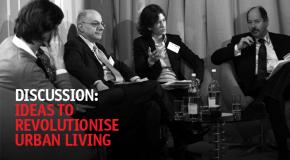As this report finds, cities need smarter and more flexible infrastructure to address these challenges— infrastructure that can make better use of existing space and resources, and that can adapt in accordance with uncertain, fast-moving future realities.
The idea of ‘flexible’ or future-proof cities is becoming more important. Imagine a roadway that works for today’s vehicles as well as tomorrow’s autonomous cars, an energy system that can provide reliable power despite spikes in usage (such as those that may come from greater adoption of electric cars), pylons that are mindful of overhead drones, a building that transforms depending on needs of its inhabitants, or an autonomous rail system that can double its capacity simply through changes to its operating algorithms.
Delivering infrastructure that is more responsive and flexible to future needs requires technological innovation as much as it does new approaches to planning, financing and procurement.
In this report, The EIU investigates the challenges facing cities and urban infrastructure in the near future, and the global trends and innovations in infrastructure that will be crucial in response. With an eye to international best practice, it focuses on the challenges and opportunities pertinent to Australia. Here, major cities are facing significant population growth forecasts that call into question their ability to continuously provide a high quality of life for their citizens. Challenges pertain to both meeting infrastructure need, and in delivering solutions, through effective planning, financing and collaboration, in time and on budget.
The key findings of the research include:
Australia is experiencing a number of growing pains. Population growth in cities is a universal trend—urban population is expected to rise by two-thirds by 2050 globally—but it is particularly acute in Australia, where cities must meet double or greater user demand without conflicting with the global targets set by the Paris Agreement and Agenda 2030. Such growth challenges the capacity and sustainability of cities’ infrastructure and the networks that connect them. Planners must also reckon with an ageing population, deteriorating infrastructure, adverse environmental change and evolving working patterns, altering the dynamics of how people operate in and navigate cities. A failure to respond to these challenges could result in declining economic productivity and threats to the quality of life for which Australian cities are renowned.
To meet future demands, infrastructure builders across the globe are considering how they can expand the capacity of existing infrastructure and bolster the flexibility of new works. Updated networks like roads, railways and pipelines often need to accommodate twice their original usage demand without changing their physical footprint. The effective adoption of digital technology will be key to this transformation, such as updating metro systems with driverless trains and automatic controls, informed by large amounts of real-time data, to allow a more efficient use of capacity. Water and energy supply systems must also prove reliable in the face of natural disasters, shifts in market prices (such as oil or gas price shocks) or changes to supply sources (backups for solar generation, for example).
New technological techniques and applications can help builders work more quickly, safely and cost-effectively. The design, construction and maintenance of infrastructure projects are increasingly driven by digital technologies, unlocking cost and time savings in building roads, railways and entire city centres. The cost and energy required to build with the highest safety margins could be reduced by remote monitoring through embedded sensors. Efficient, low-impact construction techniques will be important to reduce the disruption that construction and repairs have on metropolitan areas, too.
Stakeholders are increasingly reliant on data to plan, build and optimise projects. Data generated by citizens and connected infrastructure are increasingly critical in delivering and operating smarter cities. Governments and infrastructure providers increasingly benefit from adding this data to their modelling and scenario planning. Open data can also allow citizens and third parties to solve problems or invent new applications that benefit all, from crowdsourcing potholes or reporting crime, to building new navigation apps. Australia’s state and federal governments, citizens, and commercial partners are still grappling with data ownership issues, but all are working to address the challenges.
Mature financing and procurement practices help Australia attract international investment. Attractive markets encourage international competition for infrastructure procurement. Indeed, many of today’s projects are contracted to international players who bring advanced, ambitious proposals to government. And as demand for more advanced, flexible projects rises, players are increasingly presenting envelope-pushing approaches to win bids.
Collaboration between governments, universities and commercial players is increasing, sparking innovation. Universities are playing a larger role in the advancement and application of infrastructure technology by partnering with private companies and government. New forms of collaboration are also more apparent among federal, state and local governments, and between governments and the private sector, potentially easing the problems posed by the historically disjointed nature of decision-making and long-term planning on major infrastructure.
Australia has a strong record of robust infrastructure investment. Its leaders, institutions and businesses have identified the urgency and importance of responsible and smart infrastructure initiatives. As a result, Australia is well placed to wrestle with the challenges it faces, and, as it navigates infrastructure challenges earlier and with greater urgency than some other countries, could be a model for how other countries—in the OECD and in Asia-Pacific—can build smarter, more flexible, next-generation infrastructure in their cities.







